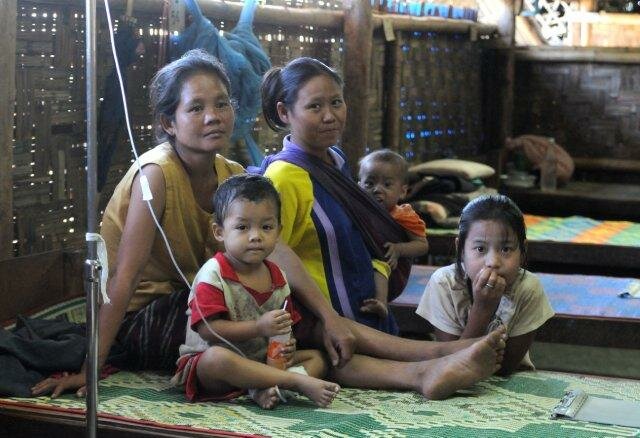 |
|
 |
|
|
|
|||||||||||
|
Joint Activities Social protection l Human rights & access to justice l Strategic information l Climate change l International cooperation l Creative economy l Other joint initiatives l Development Cooperation Seminars The UN Country Team (UNCT) in Thailand sealed a partnership with the Royal Thai Government (UN Partnership Framework or UNPAF) for the period 2012-2016. Under this framework the UN is committed to provide the highest quality policy advice and other support to Thailand as a Middle-Income Country (MIC), and to provide such support quickly, flexibly and efficiently, both as individual agencies and collectively. Under the UNPAF emphasis was placed on “Joint partnerships” on issues where there is a clear demand from the government and other stakeholders and there is a clear added value to a number of UN agencies working together. Six joint partnerships were identified: social protection; human rights and access to justice; strategic information; climate change; international cooperation; and creative economy. For details click on the menu above.
Social protection – The Joint Team on Social Protection focuses on enhancing Thailand’s capacity to establish a welfare society by 2017 through support in policy development, normative/analytical work, capacity development and knowledge management. The new partnership draws on the UN 2009 Social Protection Floor (SPF) initiative to promote holistic and coherent visions of a national social protection system that contribute to closing coverage gaps in access to essential services and social transfers, and reduce inequalities. The joint partnership has been prepared by a team of RTG agencies (led by the Ministry of Social Development and Human Security) and UN agencies (led by ILO) with four key outcomes to be reached by 2016:
Additional information about social protection can be found on http://www.social-protection.org/gimi/gess/ShowProjectPage.do?pid=1015 Click here to see the results matrix of social protection
Human rights and access to justice – The Joint Team on Human Rights and Access to Justice aims at supporting Thailand in improving the human rights situation in the country a with a focus on effective implementation of the recommendations of international human rights mechanisms, including the Universal Periodic Review, particularly in the areas of gender equality and access to justice of vulnerable people. The joint partnership has been prepared by a team of RTG agencies (led by the Ministry of Justice) and UN agencies (led by OHCHR) with four key outcomes to be reached by 2016:
Click here to see the results matrix of human rights and access to justice Strategic information –The Joint Team on Strategic Information aims to contribute to the development of unified national statistics and information systems that are able to inform policy development to reduce inequalities. The partnership facilitates sharing of best practices and lessons from other countries and introduce effective models for the creation of national statistics systems; it facilitates the integration of databases developed under various line ministries; contributes to capacity building at the national and sub-national levels on standardized data collection, data management and data dissemination systems; and promotes the use of data for the formulation of national development plans and policies to enhance social equity in Thailand. The joint partnership has been prepared by a team of RTG agencies (led by the National Economic and Social Development Board) and UN agencies (led by UNFPA) with two key outcomes to be reached by 2016:
Click here to see the results matrix of strategic information
Climate change – The Joint Team on Climate Change acknowledges UN’s comparative advantage individually and collectively in supporting a climate change programme, with many agencies potentially able to contribute in terms of technical as well as financial support. The UN has in-house expertise on climate change and disaster risk reduction issues as well as access to global expertise and can assist Thailand in identifying best practices. Drawing on the multi-sectoral mandates and expertise of UN agencies, the UN can also support Thailand in addressing the multi-sectoral nature of climate change, enhancing inter-ministerial coordination and, through its broader convening role, reaching out to other stakeholders and to the public at large. A joint partnership on climate change has therefore been prepared by a team of RTG agencies (led by the Ministry of Natural Resources and Environment) and UN agencies (led by UNEP) with three key outcomes:
Click here to see the results matrix of climate change International cooperation – The Joint Team on International Cooperation focuses on supporting Thailand in becoming a more effective development partner, and in sharing knowledge and facilitating exchanges through South-South cooperation. Through the partnership, the UN will provide policy advice to the RTG and support capacity development and knowledge management services – focusing particularly on the development of a harmonized national development cooperation policy and on supporting Thailand in becoming an international knowledge hub on priority sectors. This joint partnership on international cooperation supports the RTG’s overall development strategy on strengthening economic and security cooperation in the region and more broadly the RTG’s objective of engaging effectively as an international player. A Joint Partnership has been prepared by a joint team of RTG agencies (led by TICA) and UN agencies (led by UNDP) with two key outcomes:
Click here to see the results matrix of international cooperation
Creative economy – The Joint Team on Creative Economy was established to provide targeted support to Thailand in boosting knowledge-based economy as a key engine to move the country forward. Creative Economy will also support the RTG’s objectives of reducing inequality and encouraging sustainable non-polluting industries. The Joint Partnership is being prepared by a joint team of RTG agencies (led by Thailand Creative Economy Agency-TCEA) and UN agencies (led by UNESCO) with three key outcomes:
Other Joint Initiatives The UN collaborates on other specific themes, namely HIV/AIDS, migration, gender, and education to ensure coordinated and optimal UN approach, contributing to multiple national priorities. Coordinated work of relevant UN agencies in these areas focus on the following. HIV/AIDS: The UN system is working to address challenges posed by the AIDS epidemic by focusing on achieving results with respect to intensifying prevention, addressing stigma and discrimination, and localizing responses at the sub-national level. Three main areas of support and several cross-cutting themes have been identified: policy, advocacy and strategic planning; governance and decentralization; and programme competence.
Migration: The UN system is working with Thailand on migration issues and address challenges in managing the flow of migrants and to regularize and provide increased protection to migrant workers. Three main areas of support have been identified: migration policy formulation; capacity-building; and regional/ASEAN cooperation.
Gender: Thailand recognizes the importance of gender equality and the empowerment of women as a pre-cursor to the achievements of all MDGs Plus target to ‘double the proportion of women in the national Parliament, Tambon Administrative Organizations and executive positions in the civil service.” The gender thematic collaboration will serve as a mechanism to ensure gender mainstreaming in all aspects of the UNPAF implementation through the gender expertise of the UN system and the existing expertise and gender mainstreaming structure of the Royal Thai Government.
Education: The UN system collaborates with the Royal Thai Government on education in a coordinated manner, based on the following rationale, education is crucial to meet Thailand’s goal to develop a knowledge-based economy, contribute to reduce forms of disparities and develop human resources. The education thematic collaboration will support Thailand to provide technical support and policy advice to design appropriate interventions for the development of human resources to promote a lifelong learning society. Development Cooperation Seminars The Development Cooperation Seminars (DCS) were initiated by the Office of the UN Resident Coordinator in early 2009 and are usually jointly hosted by the Royal Thai Government and the UN System. The Seminars provide a forum for dialogue among key stakeholders on priority and/or emerging development issues in Thailand, bringing together development partners from Government, the UN system, civil society, NGOs, private sector and international partners. They are designed to generate recommendations on policy and implementation. Ten DCSs have been organized so far and all delivered concrete policy recommendations that have been considered by the government and its partners for implementation and/or translated into government/UN initiatives and programmes. The ten events covered:
|







